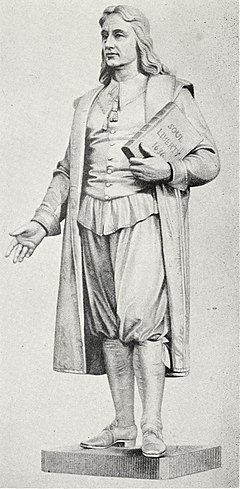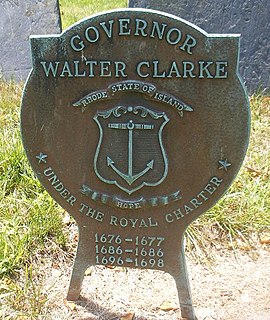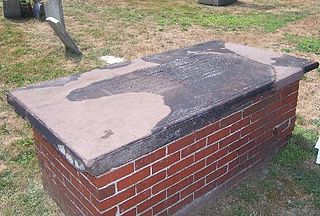
Roger Williams was a Puritan minister, theologian, and author who founded Providence Plantations, which became the Colony of Rhode Island. He was a staunch advocate for religious freedom, separation of church and state, and fair dealings with Native Americans, and he was one of the first abolitionists.

The Colony of Rhode Island and Providence Plantations was one of the original Thirteen Colonies established on the east coast of America, bordering the Atlantic Ocean. It was an English colony from 1636 until 1707, and then a colony of Great Britain until the American Revolution in 1776, when it became the State of Rhode Island and Providence Plantations.

John Clarke was a physician, Baptist minister, co-founder of the Colony of Rhode Island and Providence Plantations, author of its influential charter, and a leading advocate of religious freedom in America.

Samuel Gorton (1593–1677) was an early settler and civic leader of the Colony of Rhode Island and Providence Plantations and President of the towns of Providence and Warwick. He had strong religious beliefs which differed from Puritan theology and was very outspoken, and he became the leader of a small sect of converts known as Gortonists or Gortonites. As a result, he was frequently in trouble with the civil and church authorities in the New England colonies.

William Coddington was an early magistrate of the Massachusetts Bay Colony and later of the Colony of Rhode Island and Providence Plantations. He served as the judge of Portsmouth and Newport, governor of Portsmouth and Newport, deputy governor of the four-town colony, and then governor of the entire colony. Coddington was born and raised in Lincolnshire, England. He accompanied the Winthrop Fleet on its voyage to New England in 1630, becoming an early leader in Boston. There he built the first brick house and became heavily involved in the local government as an assistant magistrate, treasurer, and deputy.

John Coggeshall Sr. was one of the founders of the Colony of Rhode Island and Providence Plantations and the first President of all four towns in the Colony. He was a successful silk merchant in Essex, England, but he emigrated to the Massachusetts Bay Colony in 1632 and quickly assumed a number of roles in the colonial government. In the mid-1630s, he became a supporter of dissident minister John Wheelwright and of Anne Hutchinson. Hutchinson was tried as a heretic in 1637, and Coggeshall was one of three deputies who voted for her acquittal. She was banished from the colony in 1638, and the three deputies who voted for her acquittal were also compelled to leave. Before leaving Boston, Coggeshall and many other Hutchinson supporters signed the Portsmouth Compact in March 1638 agreeing to form a government based on the individual consent of the inhabitants. They then established the settlement of Portsmouth on Aquidneck Island, one of the four towns comprising the Colony of Rhode Island and Providence Plantations.

Benedict Arnold was president and then governor of the Colony of Rhode Island and Providence Plantations, serving for a total of 11 years in these roles. He was born and raised in the town of Ilchester, Somerset, England, likely attending school in Limington nearby. In 1635 at age 19, he accompanied his parents, siblings, and other family members on a voyage from England to New England where they first settled in Hingham in the Massachusetts Bay Colony. In less than a year, they moved to Providence Plantation at the head of the Narragansett Bay at the request of Roger Williams. In about 1638, they moved once again about five miles (8 km) south to the Pawtuxet River, settling on the north side at a place commonly called Pawtuxet. Here they had serious disputes with their neighbors, particularly Samuel Gorton, and they put themselves and their lands under the jurisdiction of Massachusetts, a situation which lasted for 16 years.
William Arnold was one of the founding settlers of the Colony of Rhode Island and Providence Plantations, and he and his sons were among the wealthiest people in the colony. He was raised and educated in England where he was the warden of St. Mary's, the parish church of Ilchester in southeastern Somerset. He emigrated to New England with family and associates in 1635. He initially settled in Hingham in the Massachusetts Bay Colony, but he soon relocated to the new settlement of Providence Plantation with Roger Williams. He was one of the 13 original proprietors of Providence, appearing on the deed signed by Roger Williams in 1638, and was one of the 12 founding members of the first Baptist church to be established in America.
Christopher Helme was an early immigrant to the Massachusetts Bay Colony and one of the founders of Exeter, New Hampshire.
John Sanford was an early settler of Boston, Massachusetts, an original settler of Portsmouth, Rhode Island, and a governor of the combined towns of Portsmouth and Newport in the Rhode Island colony, dying in office after serving for less than a full term. He had some military experience in England, and also was an employee of Massachusetts magistrate John Winthrop's household prior to sailing to New England in 1631 with Winthrop's wife and oldest son. He lived in Boston for six years and was the cannoneer there.

Gregory Dexter (1610–1700) was a printer, Baptist minister, and early President of the combined towns of Providence and Warwick in the Colony of Rhode Island and Providence Plantations. He was in New England as early as 1644 when he had a five-acre lot assigned to him in Providence. He had been in the printing business in London, and still operated that business in 1643 when his establishment printed Roger Williams's translation of the Narragansett language. As an experienced stationer, he offered his expertise to the printing operation in Boston in 1646, asking for no compensation other than an annual almanac.

Walter Clarke (1640–1714) was an early governor of the Colony of Rhode Island and Providence Plantations and the first native-born governor of the colony. The son of colonial President Jeremy Clarke, he was a Quaker like his father. His mother was Frances (Latham) Clarke, who is often called "the Mother of Governors." While in his late 20s, he was elected as a deputy from Newport, and in 1673 was elected to his first of three consecutive terms as assistant. During King Philip's War, he was elected to his first term as governor of the colony. He served for one year in this role, dealing with the devastation of the war, and with the predatory demands of neighboring colonies on Rhode Island territory during the aftermath of the war.

Major-General Humphrey Atherton,, was a Puritan and an early settler of Massachusetts Bay Colony. He was the 5th Major General of the Colony of Massachusetts.
Stukely Westcott was one of the founding settlers of the Colony of Rhode Island and Providence Plantations and one of the original members of the first Baptist Church in America, established by Roger Williams in 1638. He came to New England from the town of Yeovil in Somerset, England and first settled in Salem in the Massachusetts Bay Colony, but difficulties with the authorities prompted him to join Roger Williams in settling near the Narragansett Bay in 1638 at Providence Plantations. He remained there for a few years, but he was recorded as an inhabitant of Warwick in 1648, probably having settled there several years earlier. He was most active in colonial affairs from 1650 to 1660 when he was a commissioner, surveyor of highways, and the keeper of a house of entertainment. His highest offices were as an Assistant in 1653 and much later as a deputy to the General Court in 1671 when he was almost 80 years old. He made his will on January 12, 1677 but died the same day with it unsigned, leaving his affairs in limbo for the following two decades.
John Greene Jr. was a deputy governor of the Colony of Rhode Island and Providence Plantations who spent almost his entire adult life in the public service of the colony. Born in England, he was the son of John Greene Sr. and Joan Tattersall, and sailed to New England with his parents in 1635 aboard the ship James. His father, after coming from Massachusetts to Providence, became one of the original settlers of Warwick. In 1652 Greene served in his first public role as a commissioner from Warwick, and served in some public capacity every year until 1690 when he was first chosen as deputy governor of the colony. He then served 10 consecutive one-year terms in this capacity, retiring from public service in 1700 at the age of 80. He was one of the 10 Assistants named in the Royal Charter of 1663, which would become the basis for Rhode Island's government for nearly two centuries. During the devastating events of King Phillips War, Greene was one of 16 prominent inhabitants of the colony whose counsel was sought by the General Assembly.
John Greene Sr. was an early settler of the Colony of Rhode Island and Providence Plantations, one of the 12 original proprietors of Providence, and a co-founder of the town of Warwick in the colony, sailing from England with his family in 1635. He first settled in Salem in the Massachusetts Bay Colony, but he had difficulty with the Puritan authority and soon followed Roger Williams to Providence, becoming one of the original proprietors of that town. In 1643, he joined Samuel Gorton and ten others in purchasing land that became the town of Warwick. Difficulties with Massachusetts ensued, until he accompanied Gorton on a trip to England where they secured royal recognition of their town.
Randall Holden was an early inhabitant of the Colony of Rhode Island and Providence Plantations, one of the original founders of Portsmouth, and one of the co-founders of the town of Warwick. He came to New England from Salisbury, Wiltshire, England and is first recorded as one of the signers of the Portsmouth Compact. Following a few years on Aquidneck Island, he joined Samuel Gorton and ten others to establish the town of Warwick in early 1643 on land purchased from the Indian sachems.
John Albro was an early settler of the Colony of Rhode Island and Providence Plantations, a magistrate, and a long-time military officer in the Portsmouth Militia in the colony. He immigrated to New England in 1634 as a minor under the care of early Portsmouth settler William Freeborn. He was very active in civil as well as military affairs, and was an Assistant to the Governor for nine one-year terms between 1671 and 1686. During King Philip's War when the colony needed the advice and counsel of "the most judicious inhabitants" in the colony, his was one of 16 in a 1676 list of names, which included Governor Benedict Arnold and former President Gregory Dexter.
Robert Coles was a 17th-century New England colonist who is known for the scarlet-letter punishment he received in the Massachusetts Bay Colony and his role in establishing the Providence Plantations, now the state of Rhode Island.